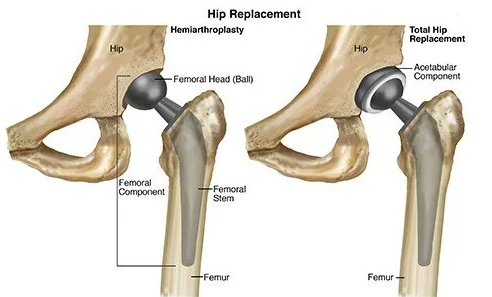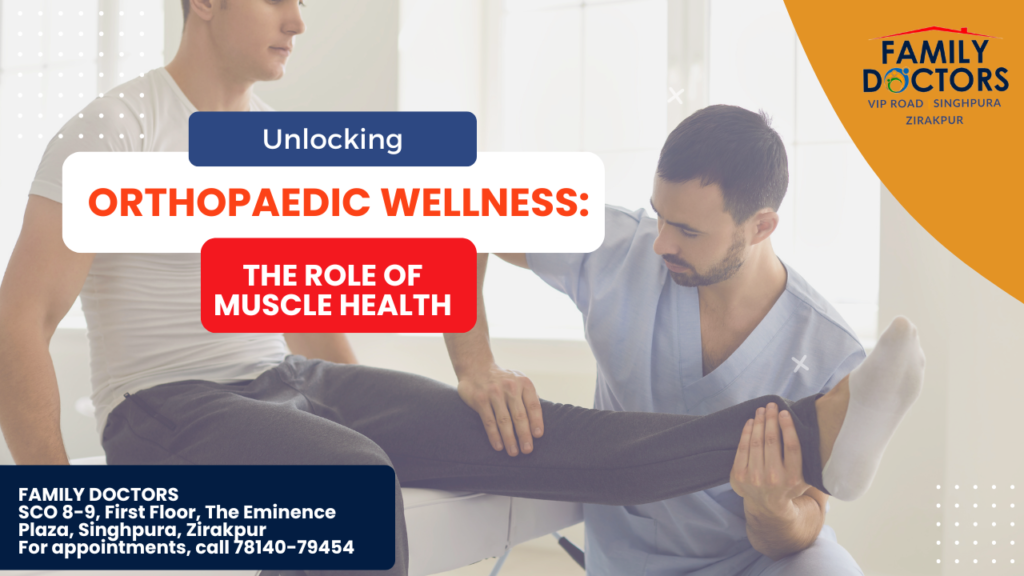As we age, one of the most significant health concerns that arise is the decline in bone density.
After the age of 60, bone density naturally decreases, making bones more fragile and prone to fractures. This can lead to painful conditions such as osteoporosis, which affects millions of older adults worldwide. However, it’s never too late to start taking steps to improve your bone health, reduce the risk of fractures, and enhance your overall quality of life. In this blog, we will explore practical ways to increase bone density after 60 and how seeking joint treatment and bone fracture treatment from an ortho doctor in Zirakpur, such as Dr. Mohit Bansal at Family Doctors Clinic, can help you manage and prevent bone-related issues.
Why Bone Density Declines with Age
As you age, the body’s ability to rebuild bone tissue slows down. Osteoblasts, the cells responsible for bone formation, become less active, and osteoclasts, the cells that break down bone, continue their work. This imbalance leads to a decrease in bone mass, which increases the risk of fractures. Factors such as hormonal changes, reduced physical activity, poor diet, and certain medications can further exacerbate bone loss. Women, in particular, experience a more rapid decrease in bone density after menopause due to a drop in estrogen levels.
Tips for Increasing Bone Density After 60
-
- Calcium and Vitamin D Intake
Calcium is the primary mineral that makes up bones, and getting enough calcium is crucial for maintaining bone health. Vitamin D plays a vital role in helping the body absorb calcium. Without enough vitamin D, bones can become brittle and weak. For adults over 60, the recommended daily intake of calcium is about 1,200 milligrams, while vitamin D should be at least 800 IU per day.
-
- Calcium-rich foods include dairy products like milk, cheese, and yogurt, as well as leafy green vegetables like kale and broccoli. For those who are lactose intolerant, calcium-fortified plant-based milk (almond, soy) or calcium supplements can be an excellent alternative.
-
- Vitamin D-rich foods include fatty fish (salmon, mackerel), fortified cereals, egg yolks, and sunlight exposure, which allows the body to produce vitamin D naturally.
If you are unsure about your nutritional needs, it is always best to consult an ortho doctor in Zirakpur such as Dr. Mohit Bansal, who can guide you on appropriate supplementation and dietary changes.
-
- Regular Weight-Bearing Exercise
Physical activity plays a critical role in building and maintaining bone density. Weight-bearing exercises, in which you work against gravity, stimulate the bone-building process. Activities such as walking, jogging, hiking, and strength training help improve bone strength and joint health. As you age, it is especially important to include weight-bearing exercises to prevent bone loss.
-
- Strength training exercises like lifting weights or using resistance bands are excellent for stimulating bone production.
-
- Balance exercises like tai chi or yoga can also help improve flexibility and prevent falls, which are a common cause of fractures in older adults.
Before starting any exercise program, it’s crucial to consult an ortho doctor like Dr. Mohit Bansal at Family Doctors Clinic to ensure that the activities you choose are safe for your current physical condition.
-
- Joint Treatment and Pain Management
Joint pain is common in individuals over 60, and untreated joint issues can further weaken bones. Regular joint treatment is essential to improve mobility and prevent stress on bones. Arthritis and other joint conditions can increase the risk of bone fractures by limiting mobility, and it is important to address these issues promptly.
-
- Physical therapy is often recommended to improve joint function and reduce pain.
-
- Medications, including anti-inflammatory drugs, might be prescribed to manage pain and inflammation.
If you are experiencing joint pain or stiffness, seeking professional treatment from an experienced ortho doctor can significantly enhance your ability to perform weight-bearing exercises, improving your bone density over time.
-
- Avoid Smoking and Excessive Alcohol Consumption
Smoking and excessive alcohol consumption can have a detrimental effect on bone health. Smoking interferes with the blood supply to bones, while alcohol disrupts the balance of calcium in the body. Both habits can lead to weakened bones and an increased risk of fractures. If you smoke or consume alcohol excessively, consider making lifestyle changes to support your bone health.
-
- Maintain a Healthy Weight
Being either underweight or overweight can negatively affect bone density. Underweight individuals may not have enough fat stores to support their bones, while those who are overweight may put excess stress on their joints and bones. Maintaining a healthy weight through a balanced diet and regular exercise is important for bone health.
-
- Bone Fracture Treatment
In the unfortunate event of a bone fracture, prompt and effective treatment is necessary to ensure proper healing and prevent long-term complications. A skilled ortho doctor in Zirakpur, such as Dr. Mohit Bansal at Family Doctors Clinic, can assess the injury and recommend appropriate bone fracture treatment. Treatment may include:
-
- Immobilization with a cast or brace to allow the bone to heal properly.
-
- Surgical intervention may be required for severe fractures, especially if the bone is broken into multiple pieces.
-
- Physical therapy to restore function and strengthen the surrounding muscles after the bone has healed.
Early intervention is crucial to prevent complications, such as deformities or joint stiffness, which can further compromise bone health.
-
- Monitor Your Bone Health Regularly
Regular bone density screenings are essential for older adults to assess bone health. A bone mineral density (BMD) test, often performed via a DEXA scan, can help detect early signs of osteoporosis and other bone-related conditions. Based on the results, your ortho doctor in Zirakpur, such as Dr. Mohit Bansal, can recommend a personalized treatment plan to help you improve bone density and reduce the risk of fractures.
Role of Dr. Mohit Bansal in Bone and Joint Care
If you are over 60 and are concerned about your bone health, seeking expert care from an experienced ortho doctor in Zirakpur is essential. Dr. Mohit Bansal at Family Doctors Clinic is a renowned orthopedic specialist who can guide you on the best course of action for increasing bone density, treating joint problems, and managing bone fractures. He provides personalized care tailored to each patient’s needs, whether it’s offering advice on weight-bearing exercises, recommending appropriate medications, or performing bone fracture treatments.
Dr. Bansal uses advanced diagnostic techniques and cutting-edge treatments to ensure the best possible outcome for his patients. Whether you’re dealing with osteoporosis, joint pain, or recovering from a fracture, Dr. Bansal’s expertise can help you maintain a high quality of life as you age.
Conclusion
Increasing bone density after the age of 60 is essential for preventing fractures and maintaining overall health. By incorporating calcium and vitamin D into your diet, engaging in weight-bearing exercises, managing joint pain, and avoiding harmful habits like smoking and excessive alcohol consumption, you can improve your bone health and reduce the risk of fractures. Regular check-ups and consultations with an ortho doctor in Zirakpur, such as Dr. Mohit Bansal at Family Doctors Clinic, can provide you with expert guidance on joint treatment, bone fracture treatment, and other orthopedic concerns.
With the right approach to bone health, it is possible to lead an active, healthy life well into your senior years. So, don’t wait—start taking care of your bones today!


